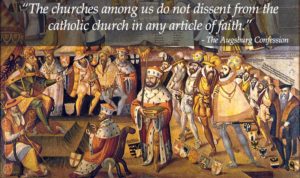The Lord be with you
Many churches these days develop statements of belief. They tend to be short and accent a few fundamental truths. One might call these mini-confessions. As a person prepares to join the church (in the more faithful ones) a closer examination of fundamental beliefs are reviewed. In the laxer churches people are accepted into membership without any further instruction and they are expected to pick things up over time. I remember attending a church of the latter kind many years ago. It was a large congregation with several pastors. It was while I was in the army. Some friends had invited my wife and me. The sermon was all about how the King James Version of the Bible was the only God-approved translation and all others were inspired by the Devil. The one version singled out as the worst was the Living Bible. As we and our friends listened I noticed them slink down lower and lower in their pew, with their Living Bibles on their pews next to them. The first thing out of Mark’s mouth as we left the service was, “I’m sorry, I didn’t know we believed that.”
Now call me silly if you want but I feel something like “What is the word of God?” is a fundamental question; one that should be answered before one joins a church. As helpful as these mini-confessions can be, they never really answer all the sorts of questions that need answers. Fortunately, for Lutherans, we have a more comprehensive source to go to, the Book of Concord. Over the next week, I will be making several posts which will be taken from the Lutheran Confession so all can know where we stand. I begin with a little background.
 On October 31, 1517, Martin Luther nailed his now famous 95 Theses to the Castle Church door in Wittenberg. This was a common practice for posting public notices. Luther’s notice was a call for a scholarly debate on the topic of Indulgences. The debate never happened, but Luther’s Theses were published far and wide, sparking the Reformation. Many joined the movement, including important political leaders. Charles V, emperor of the Holy Roman Empire and committed adherent of Rome, summoned an Imperial Diet to meet in Augsburg, Germany. The purpose was to have the princes who had joined the Reformation confess what they believed, recant of those beliefs, and return to Rome. The Lutheran princes turned to Philip Melanchthon, Luther’s right-hand man, to draft a document that not only referred to where the Evangelicals differed from Rome, but also where they agreed. He used, of course, source material. That document was submitted June 25, 1530 and was a statement of common Lutheran belief. Because the diet was in Augsburg, the document is called the Augsburg Confession. It has stood the test of time as a clear statement of Lutheran beliefs, and was incorporated into the Book of Concord (1580), which contains all the Lutheran Confessions. The following statements of what we believe, teach, and confess at Our Redeemer Lutheran Church are quotes taken from the Augsburg Confession except the last one in the eighth post, which is taken from the Epitome of the Formula of Concord (also part of the Lutheran Confessions). The translation used is that of F. Bente and W. H. T. Dau
On October 31, 1517, Martin Luther nailed his now famous 95 Theses to the Castle Church door in Wittenberg. This was a common practice for posting public notices. Luther’s notice was a call for a scholarly debate on the topic of Indulgences. The debate never happened, but Luther’s Theses were published far and wide, sparking the Reformation. Many joined the movement, including important political leaders. Charles V, emperor of the Holy Roman Empire and committed adherent of Rome, summoned an Imperial Diet to meet in Augsburg, Germany. The purpose was to have the princes who had joined the Reformation confess what they believed, recant of those beliefs, and return to Rome. The Lutheran princes turned to Philip Melanchthon, Luther’s right-hand man, to draft a document that not only referred to where the Evangelicals differed from Rome, but also where they agreed. He used, of course, source material. That document was submitted June 25, 1530 and was a statement of common Lutheran belief. Because the diet was in Augsburg, the document is called the Augsburg Confession. It has stood the test of time as a clear statement of Lutheran beliefs, and was incorporated into the Book of Concord (1580), which contains all the Lutheran Confessions. The following statements of what we believe, teach, and confess at Our Redeemer Lutheran Church are quotes taken from the Augsburg Confession except the last one in the eighth post, which is taken from the Epitome of the Formula of Concord (also part of the Lutheran Confessions). The translation used is that of F. Bente and W. H. T. Dau
You can find the Augsburg Confession and related documents at Project Wittenberg.
Blessings in Christ,
Pastor
